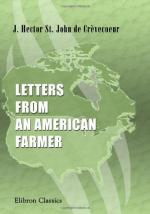My father left me a few musty books, which his father brought from England with him; but what help can I draw from a library consisting mostly of Scotch Divinity, the Navigation of Sir Francis Drake, the History of Queen Elizabeth, and a few miscellaneous volumes? Our minister often comes to see me, though he lives upwards of twenty miles distant. I have shown him your letter, asked his advice, and solicited his assistance; he tells me, that he hath no time to spare, for that like the rest of us must till his farm, and is moreover to study what he is to say on the sabbath. My wife (and I never do anything without consulting her) laughs, and tells me that you cannot be in earnest. What! says she, James, wouldst thee pretend to send epistles to a great European man, who hath lived abundance of time in that big house called Cambridge; where, they say, that worldly learning is so abundant, that people gets it only by breathing the air of the place? Wouldst not thee be ashamed to write unto a man who has never in his life done a single day’s work, no, not even felled a tree; who hath expended the Lord knows how many years in studying stars, geometry, stones, and flies, and in reading folio books? Who hath travelled, as he told us, to the city of Rome itself! Only think of a London man going to Rome! Where is it that these English folks won’t go? One who hath seen the factory of brimstone at Suvius, and town of Pompey under ground! wouldst thou pretend to letter it with a person who hath been to Paris, to the Alps, to Petersburg, and who hath seen so many fine things up and down the old countries; who hath come over the great sea unto us, and hath journeyed from our New Hampshire in the East to our Charles Town in the South; who hath visited all our great cities, knows most of our famous lawyers and cunning folks; who hath conversed with very many king’s men, governors, and counsellors, and yet pitches upon thee for his correspondent, as thee calls it? surely he means to jeer thee! I am sure he does, he cannot be in a real fair earnest. James, thee must read this letter over again, paragraph by paragraph, and warily observe whether thee can’st perceive some words of jesting; something that hath more than one meaning: and now I think on it, husband, I wish thee wouldst let me see his letter; though I am but a woman, as thee mayest say, yet I understand the purport of words in good measure, for




